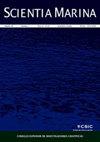气候对海水质量和绿贻贝生产的影响
IF 0.9
4区 生物学
Q4 MARINE & FRESHWATER BIOLOGY
引用次数: 2
摘要
本研究旨在研究池塘、河口和沿海地区养殖的大气参数、海水质量和绿贻贝产量之间的关系。2019年1月至12月,从泰国湾内的贻贝养殖场采集了海水和贻贝样本。气候数据来自泰国气象部门。使用线性和非线性模型建立了选定的大气和海水参数之间的相关性。采用主成分分析和逐步多元线性回归方法评价了海水质量对贻贝生产的影响。模拟了大气变化对绿贻贝生产力的影响。结果表明,高温和降雨分别导致海水温度升高和盐度降低。据观察,影响贻贝生产的最重要因素是池塘中的营养物质和溶解氧、河口的温度和盐度以及沿海地区的营养成分和pH值。模拟表明,当气温达到34°C,每月降雨量超过200毫米时,贻贝的产量会恶化。我们的研究结果表明,在气候变化事件下,河流影响较小的地区可以提供更高的贻贝生产力。这些结果可以作为气候变化事件中农民的指导方针。本文章由计算机程序翻译,如有差异,请以英文原文为准。
Influence of climate on seawater quality and green mussel production
This study aimed to investigate the relationships between atmospheric parameters, seawater quality and green mussel production which were cultured in pond, estuary and coastal areas. Seawater and mussel samples were collected from mussel farms in the inner Gulf of Thailand from January to December 2019. Climate data were obtained from the Thai Meteorological Department. The correlations between selected atmospheric and seawater parameters were developed using linear and non-linear models. The influence of seawater quality on mussel production was evaluated using principal component analysis and stepwise multiple linear regression. The effects of atmospheric variation on green mussel productivity were simulated. The results showed that high air temperature and rainfall caused an increase in seawater temperature and a decrease in salinity, respectively. It was observed that the most influential factors affecting mussel production were nutrients and dissolved oxygen in ponds, temperature and salinity in estuaries, and nutrients and pH in coastal areas. The simulation indicated that mussel production can deteriorate when air temperature reaches 34°C and rainfall is higher than 200 mm per month. Our results suggest that under climate change events, locations with less riverine influence can provide higher mussel productivity. These results can be used as a guideline for farmers during a climate change event.
求助全文
通过发布文献求助,成功后即可免费获取论文全文。
去求助
来源期刊

Scientia Marina
生物-海洋与淡水生物学
CiteScore
2.10
自引率
0.00%
发文量
21
审稿时长
6-12 weeks
期刊介绍:
Scientia Marina is the successor to Investigación Pesquera, a journal of marine sciences published since 1955 by the Institut de Ciències del Mar de Barcelona (CSIC). Scientia Marina is included in the Science Citation Index since 1998 and publishes original papers, reviews and comments concerning research in the following fields: Marine Biology and Ecology, Fisheries and Fisheries Ecology, Systematics, Faunistics and Marine Biogeography, Physical Oceanography, Chemical Oceanography, and Marine Geology. Emphasis is placed on articles of an interdisciplinary nature and of general interest.
 求助内容:
求助内容: 应助结果提醒方式:
应助结果提醒方式:


